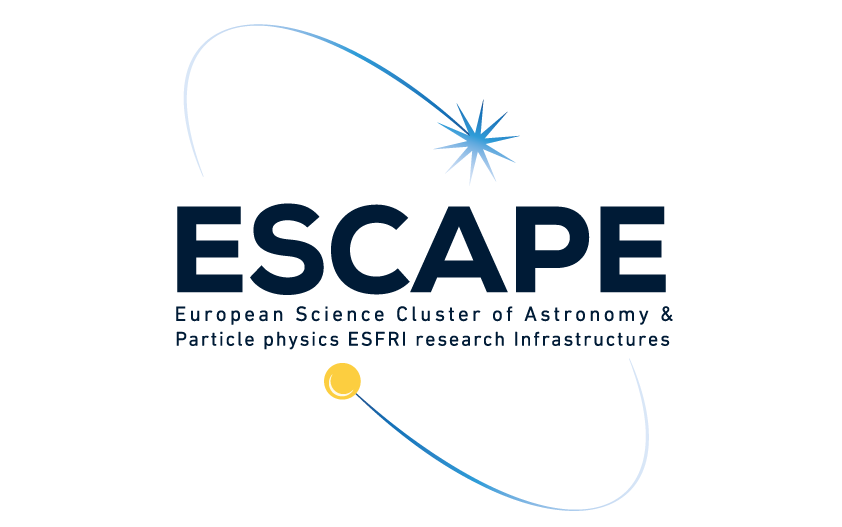

A wide range of publicly-funded Research Infrastructures (RIs) in Europe are organised in five major Science Clusters, which in the past four years implemented funded projects under the Horizon 2020 programme[1] to achieve a greater FAIRness of science[2], contributing to making research data FAIR: Findable, Accessible, Interoperable and Reproducible. ESCAPE is one of these clusters, with members including ESFRI projects/landmarks and research infrastructures such as CERN, CTAO, KM3NeT, EGO-Virgo, ESO, EST, FAIR, JIV-ERIC, SKAO and ET.
These “Science Clusters” have strived to make open data easily accessible to the users and the public, by providing scientific data management for enabling Open Science. The result is that today the Science Clusters are an integral part of the European Open Science Cloud (EOSC) initiative, contributing to its development and its implementation process. They are a powerful enabler of European research excellence and competitiveness, and they are one of the European Commission's (EC) most effective and innovative tools to network and deliver results towards the full implementation of the EOSC. They are, in addition, at the heart of disciplinary and interdisciplinary dynamics and progress, both nationally and internationally.
Their achievements in the past years include the improvement of the access to data and tools; seamless access to data and resources for data-driven science; the creation of a cross-border open innovation environment; increased efficiency and productivity of researchers through open data services and infrastructures for discovering, accessing, and reusing data; the establishment of global standards; newly developed synergies and complementarity between world-class RIs; adoption of common approaches to data management for economies of scale.
To maintain the high-momentum achieved in these past years on FAIR data management and connecting research communities from all scientific domains to the EOSC, all Science Clusters are working together in the Horizon Europe OSCARS project[3], which has been granted ~25M EUR funding in the framework of the European Commission Horizon Europe call HORIZON-INFRA-2023-EOSC-01-01, under grant agreement no.101129751.
OSCARS brings together world-class European RIs in the ESFRI roadmap and beyond, and will be implemented in the next four years.
Its first objective is to consolidate the achievements from the previous projects of the Science Clusters into lasting interdisciplinary FAIR data services and working practices. Moreover, the project will lead and foster the involvement of a broad range of research communities in EOSC by launching two Open Calls (in total worth at about 16 million Euro) for the development of new, innovative Open Science projects, that together will drive the uptake of FAIR-data-intensive research throughout the European Research Area (ERA). Projects can be proposed in the field of any of the Science Clusters by any researcher or group of researchers through a cascading grant mechanism. The first Open Call will be launched in March 2024.
Quoting Giovanni Lamanna, OSCARS project coordinator and coordinator of the ESCAPE Open Collaboration, “Science Clusters contribute to the European RI landscape evolving towards a consolidated ecosystem, through their capacity of creating a collaborative space. Researchers would opt for EOSC if on topics and for the benefit of topics that they would anyway work on, but now as a collaborative multidisciplinary activity. With the OSCARS work programme and scopes, the Science Clusters will consolidate their role as thematic EU nodes for ‘Open Research’; they will establish and operate Competence Centres and virtual research environments fostering the alignment of practices in scientific data analysis. The cascading grant action is aimed at providing a series of valuable scientific demonstrators for such a role for the benefit of EOSC.”
Through its planned actions, OSCARS will provide an opportunity for inter-cluster cross-adoption and co-development of services that will be part of the EOSC Exchange portfolio.
“Europe’s RIs will serve as some of the first Nodes (elements) of the EOSC Federation, and their active contributions continue to be important for implementing EOSC” - stated Ute Gunsenheimer, Secretary General of the EOSC Association. “The EOSC Association very much looks forward to working with the OSCARS project and the Science Clusters in the context of the Horizon Europe EOSC Partnership. As the voice of the EOSC community, the Association, with the support of EOSC Focus, facilitates the collaboration among EOSC-related projects in the areas of technology development, communication and engagement, as well as impact assessment. We are excited to welcome OSCARS into this group of doers and to showcase their results also through our EOSC implementation Macro-Roadmap.”
To increase data FAIRness, OSCARS will also further develop a FAIR-compliant certification scheme for research data, community-based science platforms embedded in the EOSC portal and providing access to FAIR data services, data sources, guidelines and training. It will, in addition, provide highly composable research-enabling services, as well as data processing and management solutions.
Furthermore, the concept of one Community-based Competence Centre (CCC) per Science Cluster is something new that will be deployed to leverage the specific achievements and competences of each cluster, addressing each scientific community’s culture and needs, while at the same time strengthening intra-cluster collaboration by sharing best practices and jointly developing common strategies.
The implementation of the work has already started, based on a long-standing collaboration among all the clusters, whose role in the ERA will be further strengthened, recognised, acknowledged and sustained for the future. It is expected that, through OSCARS, the advances in organisational models, as well as in sharing digital technologies and services for the benefit of all domains, will be further strengthened, and that there will be a widespread uptake of multidisciplinary Open Science practices in the different research communities and beyond.
This will be possible also through the collaboration with the Horizon Europe EVERSE project, which will start in March 2024, and which aims to create a framework for research software and code excellence, collaboratively designed and championed by the research communities, including major contributions by ESCAPE members, in pursuit of building a European network of Research Software Quality and setting the foundations of a future Virtual Institute for Research Software Excellence.
[1] ENVRI-FAIR (environmental science), EOSC-Life (life science), ESCAPE (astronomy and particle physics), PaNOSC (neutron and light source science) and SSHOC (SSH = social science and humanities)
[2] ESFRI Science Clusters Position Statement on Expectations and Long-Term Commitment in Open Science https://doi.org/10.5281/zenodo.4889503
[3] OSCARS is the project in response to the call HORIZON-INFRA-2023-EOSC-01-01 — Build on the science cluster approach to ensure the uptake of EOSC by research infrastructures and research communities.
Views
50,475

